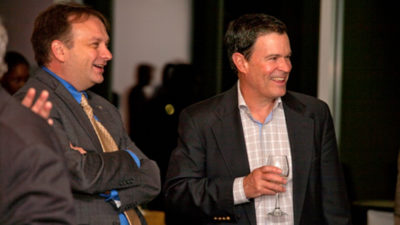Environmental woes and how to beat them
David Owen knows that experience is a great teacher. He learned first-hand that home remodeling is an expensive and unending process, that golf is futilely swinging and sometimes hitting a little white ball, and that answers to test questions that supposedly gauge our intelligence can be derived without knowing much about the subject.
On Nov. 8, Owen regaled the audience at UMKC’s Cockefair Chair lecture series with his most recent discovery – that some sustainability efforts may have a more damaging impact on our earth than we realize. After much study and introspection, Owen wrote The Conundrum: How Scientific Innovation, Increased Efficiency, and Good Intentions Can Make Our Energy and Climate Problems Worse. In it, he concludes that our consumption of energy is at the root of most environmental problems.
For the United States, our blessing as a wealthy nation is also a curse – wealthier citizens consume more energy. The amount that the average American household spends on energy is the equivalent of enormous personal wealth in other parts of the world, places where there is no refrigeration, no mechanical heating and cooling systems, no cell phones.
Owen described the United States military as our nation’s largest energy consumer, saying that they measure their travels in “gallons per mile.” He added that “a significant number of military deaths occur at refueling stations.”
In the search for answers to the energy nightmare, efficiency has been identified as the “fifth fuel,” an untapped resource that we don’t have to work hard to capture.
“Efficiency is not just low-hanging fruit,” Owen said. “It’s fruit on the ground, just waiting to be picked up.”
However, Owen was quick to point out that there are stumbling blocks to increasing efficiency. Using refrigerators as his example, he described the “paradox of efficiency.”
Energy required to operate a refrigerator fell by 75 percent from 1975 until now, but energy consumption did not see a parallel decline. The reason is simple. When a refrigerator wears out, you replace it but you don’t get rid of it. It’s now in the garage, filled with soda and leftovers. When you buy another one, the one in the kitchen goes to the basement. That is the beer refrigerator. So, no matter how efficient any of them are, energy is being used to operate three refrigerators.
As he reveals that, in the end, Americans discard 40% of their food anyway, Owen is left shaking his head in disbelief. He turned to the Internet as his next example.
“Remember how long downloads took?” Owen asked. “Now that the speed and convenience of the Internet and our PCs have improved, we simply use them more and more, often for nothing.”
Owen finished by suggesting some potential answers to rampant energy consumption.
“A poor economy spares the environment,” he said. “People don’t travel as much, turn up their air conditioners and shop less. We need to look for non-catastrophic ways to accomplish the same things.
“We have to be frugal. We could make energy more scarce, cap its extraction and make it expensive. We could encourage residential density, like New York City. But do we have the will?”
A final note, Kansas City. You are particularly vulnerable to runaway energy use because you are free to grow in all directions without any natural impediments or man-made barriers. And fossil fuels are finite.
Owen, a Kansas City native, lived in New York City after college and moved to Connecticut in 1985.

